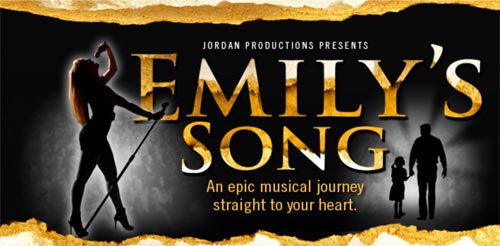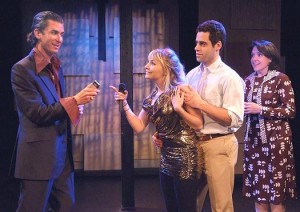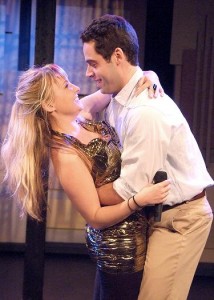
THIS SONG IS WRONG, LONG, AND GETS THE GONG
Prior to curtain up at Emily’s Song, Chet Holmes’ stultifying new musical at the Hudson Theatre, his daughter, co-composer and associate producer, Amanda, entertained us with original songs that brought to mind Norah Jones. When gorgeous, sweet-voiced Amanda finished her acoustic set and introduced the show with, “I hope you brought your tissues,” the hackles on my neck exploded with fear. Shameless hype like that just as the lights go down brings to mind Napoleon’s quote: “The best way to keep one’s word is not to give it.”
I must admit, the creators let us know what we are in for in the first fifteen minutes, for up to then there hasn’t been a musical number, the dialogue is vacuous and the characters insipid. Take the maid, Rosa, who works for jingle-writer Charlie, and his 10 year-old daughter Emily. Matronly Rosa, with her slight accent, mispronounces the word “jingle” even though she has been working in the home for over a decade. When corrected by Charlie, Rosa says, “Dingoes, Pringles, whatever.” It’s dialogue unbefitting an episode of Saved by the Bell.
 The first song we hear is a Birthday gift to Emily from Charlie – the lyrics match the motivational seminar dialogue, “Make your dream come true. Follow your heart.” This song, like most in the show, sounds as if it were pulled from a trunk of 80s pop ballads, but without the hook. My theatre companion is already fidgeting and the woman next to me is heaving musical sighs that are far more amusing than anything on stage. Let’s face it kids, it ain’t “Climb Ev’ry Mountain, Ford Ev’ry Stream.”
The first song we hear is a Birthday gift to Emily from Charlie – the lyrics match the motivational seminar dialogue, “Make your dream come true. Follow your heart.” This song, like most in the show, sounds as if it were pulled from a trunk of 80s pop ballads, but without the hook. My theatre companion is already fidgeting and the woman next to me is heaving musical sighs that are far more amusing than anything on stage. Let’s face it kids, it ain’t “Climb Ev’ry Mountain, Ford Ev’ry Stream.”
Next, Charlie is mugged while out of town. Somehow, the assailant’s knife causes Charlie to go into a coma (joining those audience members who may have already done the same). When he comes to, he has lost his life’s memory and the use of his voice. In his hospital room, Charlie gazes and listens while two doctors are having a lover’s quarrel – apparently, the female doctor is spending too much time with the patient. Even more absurd than two doctors fighting in front of this amnesiac is the well-placed keyboard near Charlie’s bed. Yes, there is a keyboard in the hospital room. It’s a preposterous, far-fetched situation that exceeds the gullibility of any Soap Opera enthusiast.
Lights up on young Emily, who looks as if she just exited the Bibbidi-Bobbidi-Boutique in Disney World. At this point, Charlie, like the musical itself, is presumed dead. Emily is sobbing to Rosa in the home of her new legal guardians, who just happen to be poor-white-trash relatives. Poof! Emily is now a teenager and the prodigy composes a teaser of a song before our eyes while her boyfriend slugs down a beer. They have a fight and she hits the streets in her Goth-light outfit, something Madonna might have worn in Desperately Seeking Susan. Now, 45 minutes (and two incomplete songs) into the show, Emily accompanies herself with a synthesizer, singing to the streets in a pop-rock tune that mercifully ends before it develops into an actual song. For the rest of the show, all but one song belongs to Emily. What is this, Trailer Park Yentl?
From here, the soap just keeps bubbling for almost two hours more: stereotype characters and implausible premises abound, such as the tough country guy who hires Emily as a waitress (one of his exit lines is, “This dang girl talk!”). When Charlie sings, “The way you look, the way you smile, the way you wear your hair,” to his doctor/girlfriend, you’ll notice that her wig – in fact, every wig in the show – looks as if it’s been sitting in the sun on beauty-school, window-display Styrofoam. My favorite is the slimy manager who takes Emily on a meteoric rise to fame – in 18 months, she’s a phenomenon with seven Grammy nominations: he says that opening for a hot star will be her big break. Wait, being nominated for seven Grammys isn’t a big break? Gimme a Break.
The scenes are getting shorter and shorter, shifting back and forth from Stage Left to Stage Right; it’s tantamount to watching a tennis game where the ball keeps hitting the net. In fact, many of the scenes are no longer than 30 seconds in length. The playwright notes that he trimmed his erstwhile Warner Brothers feature film project from 203 scenes down to 100, so now it’s “moving like the wind.” 100 scenes?! More like gone with the wind.
 Of all the talented theatre folk in Los Angeles who could have translated Emily’s Song into something new and daring (anything’s possible), writer Chet Holmes not only assigns himself the task of rewriting, but staging the thing as well. What, exactly, is Mr. Holmes showcasing here? The irony is that he seems to be showcasing the message that we can overcome our odds, yet he can not overcome his own odds as a writer and director. Either way, this is a showcase masquerading as theatre. As such, it would be foolhardy to even mention actors who are so out of place in this vehicle that we’re not even sure if they can act. Regarding Emily’s Birthday song, Charlie says, “It’s sloppy, but it’s original.” He only got it half-right.
Of all the talented theatre folk in Los Angeles who could have translated Emily’s Song into something new and daring (anything’s possible), writer Chet Holmes not only assigns himself the task of rewriting, but staging the thing as well. What, exactly, is Mr. Holmes showcasing here? The irony is that he seems to be showcasing the message that we can overcome our odds, yet he can not overcome his own odds as a writer and director. Either way, this is a showcase masquerading as theatre. As such, it would be foolhardy to even mention actors who are so out of place in this vehicle that we’re not even sure if they can act. Regarding Emily’s Birthday song, Charlie says, “It’s sloppy, but it’s original.” He only got it half-right.
Of course, I’m admittedly out-of-touch with audiences that favor pop ballads and romantic themes over style and plot. Certainly, I can understand a trend, even on Broadway, for escapist musicals – syrupy, superficial and sentimental soaps that hark back to the 1930s (girl loses dad, girl gets dad); the sad difference being that the 30’s had Gershwin, Berlin and Porter. As long as audiences keep attending this kind of star-driven drivel (as Emily, True Blood’s Lindsey Haun delivers some seriously powerful vocals), how and when will Los Angeles theatre become a leader in imagination, creativity and genesis? Some say that we get the leaders we deserve; perhaps we are getting the art we deserve.
tonyfrankel @ stageandcinema.com
photos by Ed Krieger
Emily’s Song
scheduled to close February 27 at time of publication
for tickets, visit http://www.emilyssong.com/

{ 5 comments… read them below or add one }
I have no idea who Tony Frankel is but this is a beautiful story with wonderful music. Everyone in the audience stands and applauds when it over and yet this critic writes a review like this.
I think what disturbed me most is I planned on buying tickets for my entire staff. Still will, but if they read this guy’s review, they probably would not want them.
Where did you guys find this guy. Some well placed comments might be acceptable, but clearly, this is a guy with an agenda.
Emily’s Song is a wonderful musical with a great story and truly memorable music.
To anyone looking for a truly memorable experience, I’d see the play. It is quite wonderful:)
What?????
I think this guy says it best when he states, “Of course, I’m admittedly out-of-touch with audiences that favor pop ballads and romantic themes over style and plot. Certainly, I can understand a trend, even on Broadway, for escapist musicals – syrupy, superficial and sentimental soaps that hark back to the 1930s (girl loses dad, girl gets dad)…”
Out of touch? Out of mind! Perhaps a bit too much bad LSD that night?
I happened to go to the same play that this guy viciously tore to shreds and I will tell you that not only is he wrong, but he’s downright lying. (Is he on quota for one scathing merciless review a month or something?) I am serious. If you investigate this further, I believe you will find that Mr. Frankel has some specific negative agenda and is taking it out on this terrific play.
The performance that I was in was full of laughter. No one sighed. No one was bored, as he implies that “other audience members†were. That’s just not true. If an audience hates something as much as he professes, they surely do not RISE to their feet and give a STANDING OVATION as was done when I was in attendance.
Plus, his attack on the music is stupid, as even those who gave the production luke-warm reviews, said the music was great. The Los Angeles Times said: “Emily’s Songs have great heart.†(That review is part of the reason I went.)
Emily’s Song is a spectacular piece of entertainment and I would highly recommend it to anyone and everyone. I took my my college age daughter. She loved it. Next to us was a couple with a 9 year old and a 6 year old. They loved it. EVERYONE got to their feet at the end. I am not easily impressed. I have traveled the world, been rich and been poor. So I’m not someone who gushes, but I did and still do over Emily’s Song.
Incidentally, Tony Robbins just tweeted to his 1.8 million followers: “I attended a magnificent play called Emily’s Song in LA http://bit.ly/idr7Nz It’s a must see-the story of a father & daughter that made everyone cry.â€
Only the completely ignorant would take into consideration a review with such an extreme bias. Or a review that uses the word “stultifying” in the first sentence. I don’t believe that word is much in circulation, and it certainly doesn’t belong in a review, something meant to be written at a 7th grade reading level so as to be approachable by many readers. We are not impressed by your SAT vocab insertion, it just starts off this petty review on a pompous foot. Sadly (for you), your review does not stultify this production, though it has stultified your reputation as an objective reporter.
Tony Robbins is Chet Holmes’ partner, for crissake!
I’ve seen Holmes’ work before, and this review sounds right on target.
Normally I would just ignore this idiotic review, but I may be able to help you become a bit better reviewer. First, read up a bit on genre: musicals are not normally plot driven; in fact that is the kiss of death for large musicals. You will look a lot less foolish if you understand the standards of the genre. You wouldn’t critique Hamlet on its historical accuracy or realism, would you? Or would you?
The emotional impact of human beings facing their lives and limitations is at the heart of the genre. Discussion of social issues and innovative staging are not. If they are if present at all, they are subservient to this goal; not vice-versa. Your criticisms would result in virtually all opera as being trash.
The art we deserve is variety. That is the hallmark of a great theater city. LA has it at a level only matched by NY and London in diversity and not by even them in sheer volume. Seriously, do a little homework if you are really trying to understand the local scene. You come off as clueless to anyone who is even marginally serious about this.